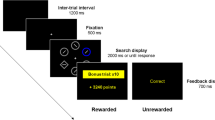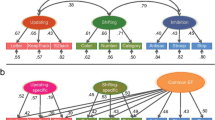Abstract
Focusing of attention is influenced by external features such as the presence of global or local target stimuli, but also by motivation and mood states. In the current study, we examined whether working on cognitively demanding tasks for 2 h, which induces mental fatigue, subsequently had a differential effect on global and local processing. The results showed that, compared to non-fatigued participants, fatigued participants particularly displayed compromised local processing. This indicates that mental fatigue may also manifest itself as effects on attentional focusing. The findings of this study are in line with recent ideas about the nature of fatigue-related cognitive deficits, implying disturbances in the control over attention and behaviour.
Similar content being viewed by others
References
Braver, T. S., Barch, D. M., Keys, B. A., Carter, C. S., Cohen, J. D., Kaye, J. A., Janowsky, J. S., Taylor, S. F., Yesavage, J. A., Mumenthaler, M. S., Jagust, W. J., & Reed, B. R., (2001). Context processing in older adults: evidence for a theory relating cognitive control to neurobiology in healthy aging. Journal of Experimental Psychology: General, 130, 746–763.
Cohen, J., & Servan-Schreiber, D. (1992). Context, cortex, and dopamine: a connectionist approach to behavior and biology in schizophrenia. Psychological review, 99, 45–77.
Derryberry, D., & Reed, M. A. (1998). Anxiety and attentional focusing: trait, state, and hemispheric influences. Personality and Individual differences, 25, 745–761.
Derryberry, D., & Reed, M. A. (2001). A multidisciplinary perspective on attentional control. In C. folk & B. Gibson (Eds.). Attention, distraction, and action: Multiple perspectives on attentional capture (pp. 325–347). London: Elsevier.
Derryberry, D., & Tucker, D. M. (1994). Motivating the focus of attention. In P. Niedenthal & S. Kitayama (Eds.). The heart’s eye: emotional influences in perception and attention (pp. 167–192). New York: Academic
Dimond, S. J., & Beaumont, J. G. (1972). On the nature of interhemispheric effects of fatigue. Acta Psychologica, 36, 443–449.
Enns, J. T., & Kingstone, A. (1995). Access to global and local properties in visual search for compound stimuli. Psychological Science, 6, 283–291.
Eriksen, C. W., & St. James, J. D. (1986). Visual attention within and around the field of focal attention: a zoom lens model. Perception and Psychophysics, 40, 225–240.
Gaillard, A. W. K. (2001). Stress, workload, and fatigue as three biobehavioral states: a general overview. In P. A. Hancock & P. A. Desmond (Eds.). Stress, workload, and fatigue (pp. 623–639). Mahwah: New Yersey.
Hockey, G. R. J. (1997). Compensatory control in the regulation of human performance under stress and high workload: a cognitive-energetical framework. Biological Psychology, 45, 73–93.
Holding, D. (1983). Fatigue. In R. Hockey (Ed.). Stress and fatigue in human performance (pp. 145–164). Durnham: Wiley.
Ishiwari, K., Weber, S. M., Mingote, S., Correa, M., & Salamone, J. D. (2004). Accumbens dopamine and the regulation of effort in food-seeking behavior: modulation of work ouput by different ratio of force requirements. Behavioural Brain Research, 151, 83–91.
Ivry, R. B., & Robertson, L. C. (1998). The two sides of perception. Cambridge: MIT Press.
Kimchi, R. (1998). Uniform connectedness and grouping in the perceptual organization of hierarchical patterns. Journal of Experimental Psychology: Human Perception and Performance, 24, 1105–1118.
Kimchi, R., Hadad, B., Berhmann, M., & Palmer, S. E. (2005). Microgenesis and ontogenesis of perceptual organization: evidence from global and local processing of hierarchical patterns. Psychological Science, 16, 282–290.
Kruglanski, A. W., & Webster, D. M. (1996). Motivated closing of the mind:“seizing” and “Freezing”. Psychological Review, 103, 263–283.
Lamb, M. R., Robertson, L. C., & Knight, R. T. (1989). Attention and interference in the processing of global and local information: effects of unilateral temporal-partial junction lesions. Neuropsychologia, 27, 471–483.
Lorist, M. M., & Tops, M. (2003). Caffeine, fatigue, and cognition. Brain and Cognition, 53, 82–94.
Lorist, M. M., Klein, M., Nieuwenhuis, S., De Jong, R., Mulder, G., & Meijman, T. F. (2000). Mental fatigue and task control: planning and preparation. Psychophysiology, 37, 1–12.
Marczewski, P., van der Linden, M., & Laroi, F. (2001). Further investigation of the supervisory, attentional system in shizophrenia: planning, inhibition, and rule abstraction. Cognitive Neuropsychiatry, 6, 175–192.
Miller, J., & Navon, D. (2002). Global precedence and response activation: evidence from LRPs. The Quartely Journal of Experimental Psychology, 55a, 289–310.
Navon, D. (1977). Forest before trees: the precedence of global features in visual perception. Cognitive Psychology, 9, 353–393.
Navon, D. (2003). What does a compound letter tell the psychologist’s mind?. Acta Psychologica, 114(3), 273–309.
Roux. F., & Ceccaldi, M. (2001). Does aging affect the allocation of visual attention in global and local information processing?. Brain and Cognition, 46, 383–396.
Sanders, A. F. (1998). Elements of human performance. London: Lawrence Erlbaum.
Schellekens, J. M. H., Sijtsma, G. J., Vegter, E., & Meijman, T. F. (2000). Immediate and delayed after-effects of long lasting mentally demanding work. Biological Psychology, 53, 37–56.
Schneider, W. (1988). Micro experimental laboratory: an integrated system for IBM PC compatibles. Behavior Research Methods, Instruments and Computers, 20(2), 206–217.
Smit, A. S., Eling, P. A. T. M., & Coenen, A. M. L. (2004). Mental effort causes vigilance decrease due to resource depletion. Acta Psychologica, 115, 35–42.
Van der Linden, D., Frese, M., & Meijman, T. F. (2003). Mental fatigue and the control of cognitive processes: effects on perseveration and planning. Acta Psychologica, 113, 45–65.
Van der Linden, D., Frese, M., & Sonnentag, S. (2003). The impact of mental fatigue on exploration in a complex computer task: rigidity and loss of systematic strategies. Human Factors, 45, 483–494.
Wald, F. D. M., & Mellenbergh, G. J. (1990). De verkorte versie van de vertaling van de profile of Mood States (POMS) [The translation of the shortened version of the Profile of Mood States]. Nederlands Tijdschrift voor de Psychologie, 45, 86–90.
Webster, D. M., Richter, L., & Kruglanski, A. W. (1996). On leaping to conclusions when feeling tired: mental fatigue effects on impression primacy. Journal of Experimental Social Psychology, 32, 181–195.
Zijlstra, F. R. H. (1993). Efficiency in work behavior: a design approach for modern tools. Delft: Delft University Press.
Author information
Authors and Affiliations
Corresponding author
Rights and permissions
About this article
Cite this article
van der Linden, D., Eling, P. Mental fatigue disturbs local processing more than global processing. Psychological Research 70, 395–402 (2006). https://doi.org/10.1007/s00426-005-0228-7
Received:
Accepted:
Published:
Issue Date:
DOI: https://doi.org/10.1007/s00426-005-0228-7




